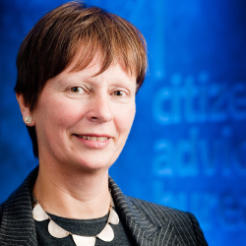Gillian Guy, chief executive of Citizens Advice, explains why charities need to respond to changes in society to ensure that volunteering is sustainable.
Earlier this month the voluntary sector rightfully paid tribute to the valuable contribution made by volunteers. The 23,000 volunteers at Citizens Advice are professionals at what they do and we know that volunteering brings huge benefits to the communities they serve. But as a sector it is important to recognise that our society is changing in ways that that have specific consequences for volunteering.
The nature of work has shifted, meaning some people have fewer set or regular hours and secure employment. Home ownership has fallen away, so people are less tied to one place to live and communities are more transient. Changes to family structures, and the ageing population mean more people are living alone, bringing the negative physical and mental health impacts of isolation into sharp focus.
As a sector we need to find ways to respond to these changes if we are to meet the diverse motivations of our volunteers, and ensure that volunteering meets the needs of society. This response has to be evident in both what we are offering volunteers, and how we work with other agencies, including government, to tackle some of the big issues people are facing.
A new Citizens Advice report, Giving back, going forward, finds that people overwhelmingly volunteer to give back - a generosity that is inspiring. Volunteers often have secondary reasons to offer their time, reflecting shifts in the way people live their lives.
Two-fifths of Citizens Advice volunteers said wanting to keep physically and mentally active motivated them to volunteer. For those living alone, volunteering offers a chance to extend their social circle and alleviate mental and physical health problems associated with isolation.
Establishing and promoting health and wellbeing benefits of volunteering can encourage understanding of this amongst prospective volunteers, as well as demonstrating the wider impact of the voluntary sector.
Volunteering was also cited as a way to develop new skills to get into or back to work. This had a particular pull for mothers returning to work and those looking to move from education into employment. There is an opportunity for the sector to look at how volunteering can explicitly help to improve employability and how to appeal to people further from the labour market.
Unsurprisingly, some see volunteering as a way to be more involved in their local community. With home ownership down, renting up and fewer people living permanently in one location, volunteering can give residents a stake in their community. As a sector it is important we keep proactively reaching out to those beyond the civic core so that our volunteers reflect the diversity of local people.
As voluntary organisations we need to consider all the aspects of a volunteer’s experience when creating and promoting opportunities. Collaborating with other agencies in the relevant fields, such as local councils or mental health professionals, can also help voluntary organisations to reach groups who may benefit most from volunteering.
Volunteering needs to be sustainable in a changing society. It can also be part of the answer to some of the big challenges we face as a nation; health and wellbeing, employment skills, and integrated communities, as well as potentially minimising the need for costly interventions in these areas.
Voluntary services not only help the clients who use them, but also those who provide them, and wider society. That’s why as a sector we need to work towards a responsive volunteering offer that both recognises and realises the full potential and impact of our amazing volunteers.
Gillian Guy CBE is chief executive of the national charity Citizens Advice









